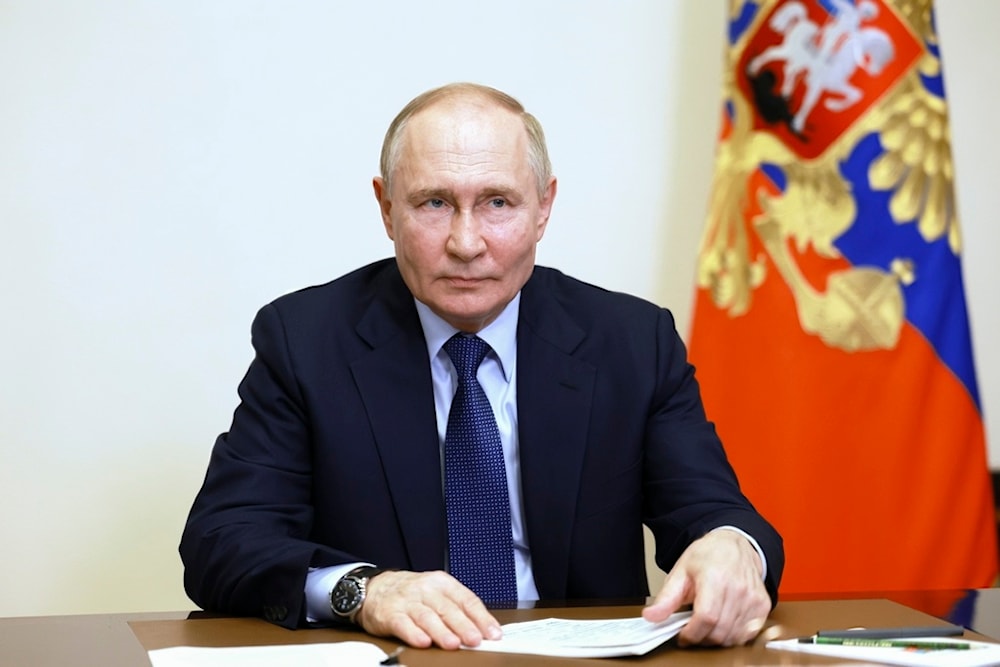Putin urges INF production amid US deployment in Europe
According to the Russian head of State, the US not only produces INF weapons but also deploys them in Europe.
-

Russian President Vladimir Putin speaks during a meeting with graduates of Russian Presidential Academy of National Economy and Public Administration via videoconference at the Novo-Ogaryovo residence outside Moscow, Russia, Friday, June 28, 2024. (Vyacheslav Prokofyev, Sputnik, Kremlin Pool Photo via AP)
Russian President Vladimir Putin on Friday stated that Russia needs to react to actions by the US, suggesting it may be necessary for the country to initiate the production of intermediate-range nuclear strike systems (INF).
"We need to respond to this and make decisions about what we will have to do in this direction next. Apparently, we need to start manufacturing these systems and then, based on the actual situation, make decisions about where – if necessary to ensure our safety – to deploy them," Putin said during meeting with the permanent members of the Russian Security Council.
Putin noted that the US not only produces INF weapons but also deploys them in Europe.
"In 2019, we announced that we would not produce these missiles, and we would not deploy them until the United States deployed these systems in some region of the world. Today it is known that the United States not only produces these missile systems, but has already brought them to Europe for drills, to Denmark," he added.
Putin stated that it is currently unknown whether the US has removed medium- and short-range missiles from the Philippines, where they were previously deployed for drills.
Read more: US 15 years behind China in nuclear power development: Report
On June 20, Putin announced that Russia is contemplating revisions to its nuclear doctrine in response to recent developments, which could see the threshold of using nuclear weapons lowered.
The president's remarks were made amid growing discussions in Western circles about the use of nuclear weapons, necessitating a proportional response from Moscow given the critical importance of nuclear warfare to humanity's continuity.
Speaking at a press conference during his visit to Vietnam, Putin expressed concerns over emerging technologies, including ultra-low power nuclear devices being discussed by Western experts.
"Now we are also thinking about what and how could be changed in the nuclear doctrine, in the strategy. And it is connected with this. It is connected with the fact that there are new — in any case, we know that the probable enemy is working on it — new elements related to lowering the threshold for the use of nuclear weapons," Putin said.
Putin dismissed the necessity of a preemptive nuclear strike clause in Russia's doctrine as he expressed confidence in Russia's capability to respond effectively to any aggression with a retaliatory strike.
Russia will develop its nuclear triad to guarantee deterrence
A week ago, the President announced that Moscow is planning supply its army on the frontline with the latest weaponry and drones to fight Ukrainian forces.
"We plan to further develop the nuclear triad as a guarantee of strategic deterrence and to preserve the balance of power in the world," Putin emphasized.
Russia's nuclear triad is comprised of land, sea, and air-launched nuclear missiles, which award Moscow the ability to deliver its nuclear warheads at enemy targets.
The country does not only have the largest nuclear arsenal in the world but it also owns some of the most sophisticated targeting systems, which include a flurry of intercontinental ballistic missiles (ICBMs), strategic submarine-launched missiles, and nuclear-capable cruise missiles.
Read more: US prepared 'rigorously' for nuclear threat in Ukraine since 2022: CNN

 3 Min Read
3 Min Read









